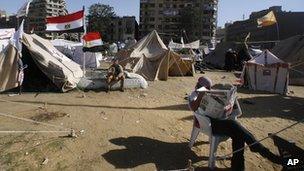Egypt crisis offers no easy way out
- Published

With crowds of demonstrators in Cairo's Tahrir Square, it may look like "deja vu" all over again.
But is this really a repeat of what happened last year, when the crowds in the square toppled former President Hosni Mubarak?
When the current demonstrations started on 23 November, the focus was on the presidential decree, by which the president gave himself sweeping new powers.
Increasingly, as those protests have continued, the chant has been of "erhal" - meaning "leave" - exactly as they shouted at Mr Mubarak.
The demonstrations have become increasingly personal and directed towards President Mohammed Morsi himself.
The protesters have focused their energy on maintaining a sit-in outside the official residence, the presidential palace.
Some of them even joined the president at Friday prayers at his local mosque 10 days ago.
When the preacher compared the president to the Prophet Muhammad, supporters and opponents of the president started angrily shouting at each other inside the mosque.
As the president was hustled away to safety, it came close to a brawl.
'Oath breached'
But unlike last year, Egypt is not united against the president.
Even some of his opponents accept that he was democratically elected. They just want to change the policies, not the president.
Yet some commentators, such as Hisham Kassem, a publisher and human rights activist, believe President Morsi has lost credibility and legitimacy.
"His presidency is completely discredited", says Mr Kassem. "He is not trusted by the bulk of Egyptians.
"[The Muslim Brotherhood] misread something. Egyptians will not take authoritarian rule any more.
"This is not coming from an analyst or an activist. It is what you hear all over the street. Egyptians have suffered because of authoritarianism, and they fear relapsing into it again."
Activists point out that Mr Morsi pledged, at the time he was sworn in, to rule for all of Egypt.
Yet they feel that the president has been representing the interests of the Muslim Brotherhood and other Islamists.
Some even believe the president has breached his oath of office, in which he swore to abide by the constitution.
By contrast, his supporters stress that Mohammed Morsi was democratically elected.
They are saying that he is fulfilling that mandate, trying to give Egypt a new constitution and parliamentary elections as quickly as possible.
Although the Muslim Brotherhood and their Islamist allies won a majority of seats in last year's parliamentary elections, they benefitted disproportionately from the voting system.
Close analysis of the vote, particularly in the proportional list rather than first past the post voting, suggests that Islamists and the parties that support them have about as much support in Egypt as their secular opponents. Egypt is divided, deeply.
Fighting on two fronts
Supporters and opponents come from across the country, across different social classes.
The opposition is sometimes characterised as liberal. But it includes many people willing to take to the streets, sometimes violently.
There have been numerous attacks on offices of the ruling Muslim Brotherhood, particularly in its heartland around the Suez Canal and in the Nile Delta.
That suggests a deeper anger, beyond the ideological division between Islamists and secularists.
Many Egyptians are furious that their lives have not got better since the revolution.
They point to a lack of reform, with no economic progress, no attempt to cleanse the notoriously brutal and corrupt police force, let alone any success in sorting out Egypt's many other problems, such as the piles of rubbish on the streets, the terrible traffic, and the filthy and polluted environment.
As for President Morsi, he is fighting a battle on two fronts.
While many opponents object to the Islamic tendencies in the new constitution, he is also under enormous pressure not to give ground to the liberals.
That pressure comes from the hardline Islamists known as Salafists, and from those within the Muslim Brotherhood who share their views.
Digging deeper
All of that shows why it has become so difficult to find a way out of this crisis.
If anything, both sides are digging themselves deeper and deeper into uncompromising positions.
It is hard to share the view of some pessimists, that this country is edging towards civil war.
Yet if no compromise is possible, the government certainly looks to be increasingly authoritarian.
But is the army really going to go out on the streets, to give its full support to an Islamist government that probably does not command the support of the majority of Egyptians?
So for the moment, the crisis moves on, perhaps to an inevitable, but highly contested, referendum on the constitution on Saturday.
Will that vote end this crisis once and for all?
It seems most likely that the better discipline of the Islamists will win the day in the referendum.
So does the opposition accept such a result? Or does it just leave the country ever more divided and deeper in conflict with itself?
There is, quite simply, no quick or obvious way out of this crisis.